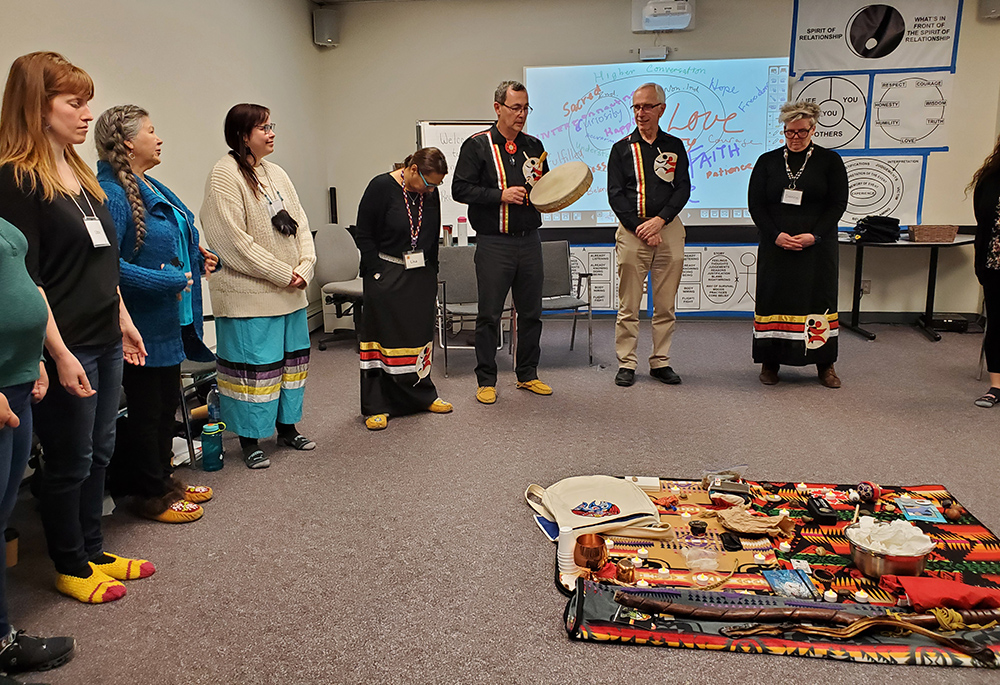
A group of people participate in a March Advancing Reconciliation workshop in Winnipeg, Manitoba, hosted by Returning to Spirit, a nonprofit organization. (Courtesy of Returning to Spirit)
In her 15 years leading reconciliation workshops across Canada, Lisa Raven has witnessed powerful scenes involving nuns.
There was that time when an Indigenous man asked a sister dressed in full religious attire — a painful reminder of his residential-school days — to smudge his back with an eagle feather to complete his grounding ritual.
Or that day when a former residential school teacher spoke about her guilt, the questions she'd had at the time, and how little say the sisters had. Among the group were survivors from the school.
"Her sharing her experience really opened our eyes. The powerlessness, the helplessness, the confusion, the angst, the struggle that we would have never known," Raven recalled in an interview. "Everyone loved her and wanted to take pictures with her, because for them, that was a moment of reconciliation, where people could open up to each other."
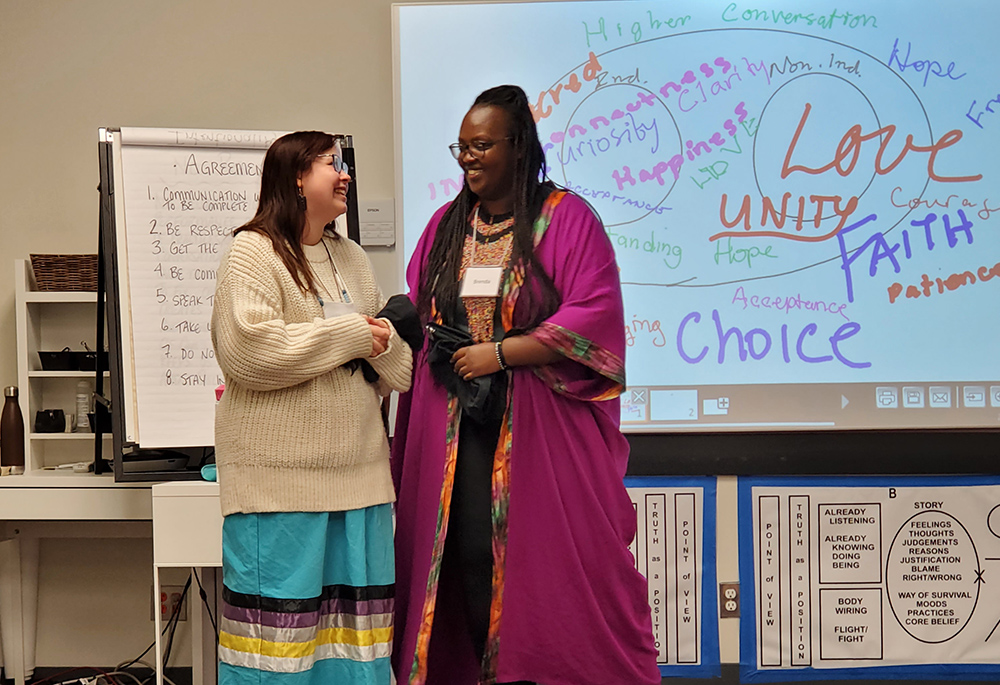
Participants Sharlaine and Brenda at a March Advancing Reconciliation workshop in Winnipeg, Manitoba, hosted by Returning to Spirit. (Courtesy of Returning to Spirit)
The Catholic Church ran the majority of Canada's boarding schools, known there as residential schools. For First Nations, Métis and Inuit students who were taken away from their family and forced to attend, priests and nuns are a reminder of the emotional, physical and sexual abuse many endured within those walls. Returning to Spirit, the Manitoba-based, nonprofit organization now headed by Raven, was created to help religious and Indigenous communities overcome that rift.
Designed more than two decades ago by Marc Pizandawatc, an Algonquin man with experience in Indigenous healing workshops, and Sr. Ann Thomson, an educator from the Sisters of St. Ann, the program takes a two-step approach. Indigenous and non-Indigenous participants first attend separate workshops, guided by someone from their community, to identify and challenge their biases in a safe space. A second workshop brings the groups together for conversations. (Editor's note: Sr. Ann Thompson died Dec. 2, 2019, at age 77. Her obituary notes that "she worked with Indigenous and other professional resource people to develop a workshop model for healing and reconciliation called Returning to Spirit that is now used nation-wide.")
The model has withstood the test of time. If anything, it is more in sync with today's growing awareness among non-Indigenous people that they need to take a more active role in reconciliation, said Raven. Besides, the trauma is still very present and painful, including for people who never set foot in the schools, she added.
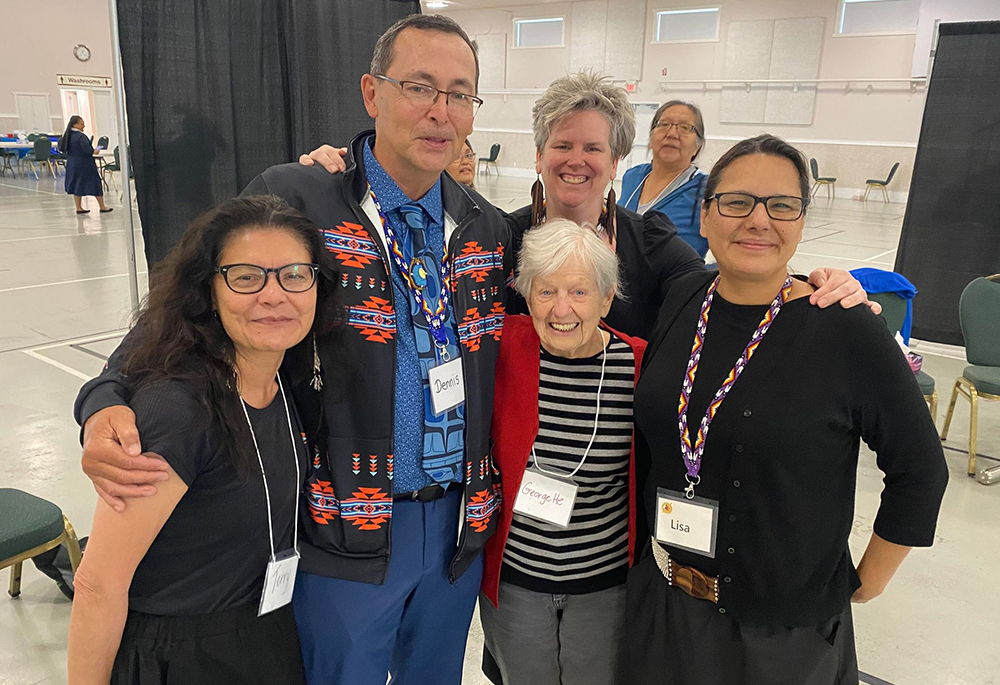
Trainers Terry Lynn Luggi, Dennis Chartrand, Dianne Little and Lisa Raven with participant Georgette in Duncan, British Columbia, at Returning to Spirit's Advancing Reconciliation workshop (Courtesy of Returning to Spirit)
"We're talking about intergenerational trauma today amongst the Indigenous people who never went to residential school: they're carrying a lot of stuff that's been passed down from their ancestors," she said. "We're seeing that on the church side too. A lot of the clergy and laypeople today had nothing to do with residential schools. But they are dealing with a form of intergenerational trauma themselves, they're carrying the burden of the mistakes of their ancestors."
Raven, who is from the Hollow Water First Nation, knows this firsthand. She grew up with a grandfather who hurt her, after being hurt himself in residential school. She became resentful of the church, a bias that tainted her view of non-Indigenous people and affected her relationship with her Catholic mother. But she didn't fully realize it until she took her first Returning to Spirit workshop, in 2005.
The four-day workshop is based on the idea that reconciliation starts with oneself. Participants learn how an event that finished long ago, like the schools, may still be incomplete for people who hold an emotional attachment to it. They reflect on how they interact with that issue. Do they get angry and blame? Do they withdraw? Do they pretend it didn't happen? Do these reactions extend to other areas of their lives?
"It's this whole discovery of: 'This is how I am in this situation,' " said Raven. "It's figuring out our own system, how we handle things. Then the possibility to let it go starts to show up. Because you know exactly what you're letting go."
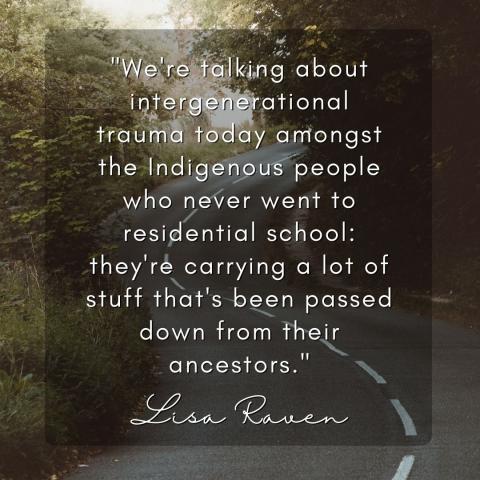
In the second, five-day workshop, groups still spend two days separately to prepare for their meeting, learning skills to handle an intense emotional reaction. When they merge, everyone is introduced: Who is a survivor, who is a teacher, who is clergy? Collectively, they discuss the path to forgiveness, including acceptance that the past can't be changed.
Then comes the time for one-on-one conversations. Based on the early introductions, everyone chooses a partner, and the two wander off for half an hour to an hour. They come back, pick someone else, and repeat for about two days. "Those little conversations create an opening, they create a possibility to reconnect, to understand each other," Raven said.
The process is uncomfortable, but attendees tend to stick to it: Returning to Spirit had a 98% completion rate last year, and about 500 participants. Sisters involved in the residential schools have taken part in the workshop, as have other sisters who were not, said Sr. Marie Zarowny, president and board chair of the Sisters of St. Ann, which helped run four residential schools. Many dioceses participated before 2010, Raven said.
Today, non-Indigenous participants include both clergy (the workshop is recommended for orientation of new members) and other communities, such as social workers. Government funding, grants and donations, including from congregations such at the Sisters of St. Ann, help cover the cost of the workshops, and allow those who cannot afford the full fees to participate.
Advertisement
Raven remembers her first joint session as a participant clearly. For her, that was the first time she ever heard religious people address the impact of residential schools on their lives. The hurt of all being blamed for the ugly transgressions.
"They were coming into communities to share love, the love of God … and that's their mission. That's their calling," she said. "But then, all of a sudden, they're being rejected or even called names. It never occurred to me, that there was feeling on the other side, that there was a human being on the other side of that. And now that's what opened my eyes."
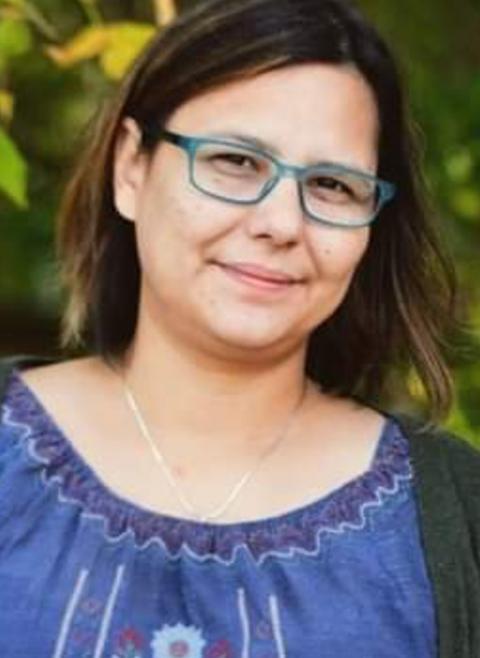
Lisa Raven (Courtesy of Lisa Raven)
For her, the experience was transformational. She became more open to other points of view. She also realized her own, one-year stay in residential school had not been bad. (The government, and at times Indigenous communities took over the schools after 1969). It was her grandfather's experience she had been carrying.
But she also understood that reconciliation is a journey. To this day, Raven can still occasionally feel anger return, like in 2021, when radars located possible unmarked graves of children outside the former residential school of Kamloops, in British Columbia. But she knows how to address it.
"I'm lucky that I know lots of people in the religious community, because I've built those relationships throughout my career," she said. "When Kamloops happened, they were the first ones that I called."
On those calls, all got a chance to share what they felt and were dealing with.
"In that one-on-one conversation, there's an understanding that both sides are suffering," Raven said. "That, actually, is our reconciliation process."







